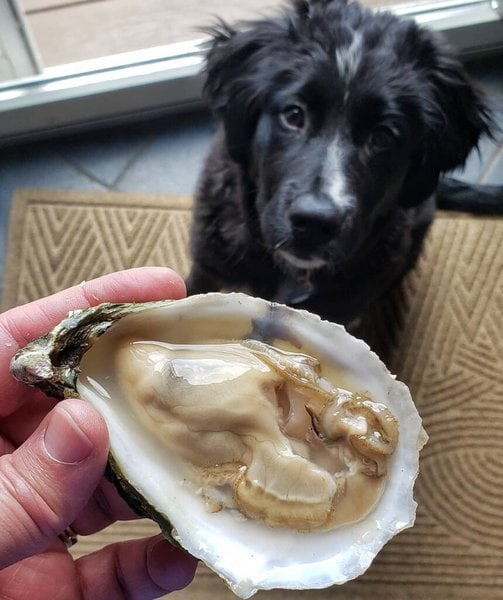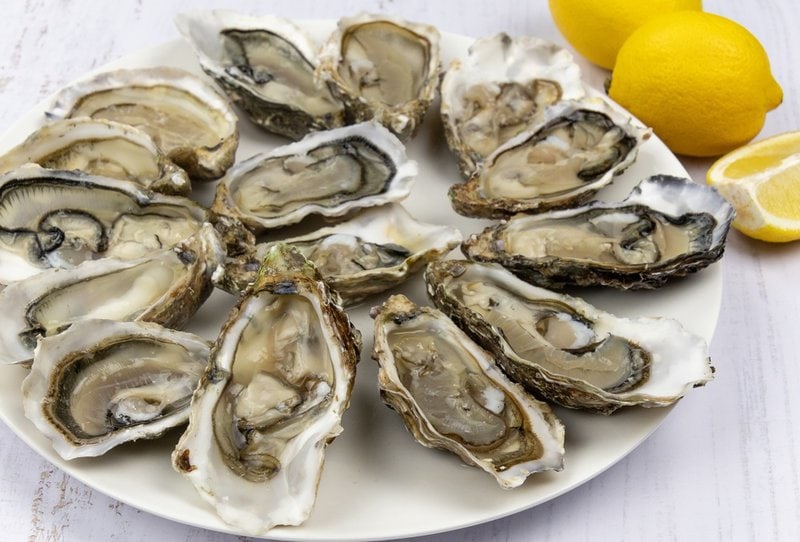Bivalve mollusks, or oysters, are a fantastic delicacy in seafood cuisine. As members of the family, Ostreidae, they are commonly found in marine habitats because they thrive in saltwater environments. Average Americans eat oysters about twice a month, and one may wonder if dogs can eat them too.
Yes, oysters can be a part of your pooch’s diet only if they are cooked well and served without added seasonings. Thus, steamed, boiled, or roasted oysters are safe for your canine to eat in moderation. Oysters generally provide nutrients, such as protein, vitamins, and minerals, essential to a dog’s health. However, they should only be given as an occasional treat because they are high in sodium and fat.
This article explores how oysters can hurt your pup if not fed in moderation. In addition, we review the benefits of oysters for doggies, the potential side effects some dogs experience, and the ideal serving size and preparation methods. But first, let’s review why you should always avoid giving raw oysters to your doggie.
Can Raw Oysters Hurt Dogs?

Yes, raw oysters can be dangerous for your pup because their biological makeup differs from ours. In addition, raw oysters carry bacteria and parasites that can harm a dog’s health. Therefore, feeding your pooch raw oysters is not recommended.
If you decide to give your pet oysters, ensure they are cooked thoroughly first. This will help kill any harmful bacteria that may be present.
Additionally, oysters contain a high concentration of purines that can lead to the development of urate stones in your furry friend’s urinary tract and bladder. These stones can cause blockages or other problems, such as infection and inflammation, if not treated quickly.
Let’s break down the top two reasons you shouldn’t feed raw oysters to doggies:
Vibrio Infection
Raw oysters can cause a potentially deadly infection in your pup known as Vibriosis. This condition is caused by the bacterium Vibrio vulnificus, found in warm saltwater and estuarine environments. Suppose your pooch eats an infected raw oyster. In that case, your dog can become ill with severe gastrointestinal symptoms such as vomiting, diarrhea, and abdominal pain.
In addition, the bacteria can enter the bloodstream and cause a systemic infection known as septicemia, resulting in organ failure or death if not treated immediately.
The best way to prevent Vibrio infection in dogs is to avoid feeding them raw oysters.
Norovirus Infection
Raw oysters can also be dangerous for your canine if they contain norovirus. Norovirus is a highly contagious virus that can cause severe gastrointestinal illnesses in humans and animals, especially dogs. It is typically spread through contaminated water, surfaces, or objects. But it can also be found in raw shellfish, such as oysters.
Consuming raw oysters contaminated with norovirus can cause vomiting, diarrhea, lethargy, and loss of appetite in your dog. The virus can cause more severe symptoms, such as dehydration and, plausibly, death, if left untreated.
What Do Oysters Do For Dogs?

Oysters provide a few benefits for dogs because they contain high zinc levels, which are vital for dogs’ skin, coats, and eyesight. Oysters also provide essential fatty acids that help joint health and reduce the risks of arthritis. Additionally, the calcium in oysters helps promote healthy teeth and bones.
As a source of protein, oysters can help dogs stay fit and energized. Additionally, the 120 mg of phosphorus in oysters can help improve digestion in dogs by aiding the absorption of vitamins and minerals from their food.
So feeding your dog oysters can benefit their overall health. They make a tasty treat, too, if provided in moderation. Let’s find out some more benefits oysters can provide your furry friend!
Enriched With Nutrients
Oysters are rich in omega-3 fatty acids, proteins, and minerals, such as zinc, iron, calcium, and magnesium. Omega-3 fatty acids help improve heart health and reduce inflammation. The proteins in oysters provide essential amino acids for muscle development, and the minerals support bone health.
High-Quality Protein Source
The key benefit that oysters offer is high protein. A single 3-ounce serving of oysters provides a whopping 15 grams of protein, which is more than an egg or a small chicken breast. In addition, dogs better absorb and utilize the protein from oysters than they do plant-based proteins, making it ideal for canines that need more protein.
Contains Antioxidants
The antioxidants in oysters help reduce your canine buddy’s risk of cancer and heart disease. Oysters also help boost the immune system and fight infection. In addition, dogs can eat oysters as treats, and oyster powder supplements are available to add to your pet’s meals.
Besides these health benefits, oysters have a few downsides that can harm your pup when consumed in large amounts.
Can Oysters Cause Diarrhea In Dogs?
Yes, oysters can cause diarrhea in dogs if fed in large amounts. Oysters are not a typical food for dogs, and the high salt content can upset their stomachs. If your pooch has eaten oysters in large quantities and is experiencing diarrhea, it is crucial to seek veterinary care.
Your vet may want to do tests to check for Vibrio vulnificus and will probably prescribe antibiotics if the bacteria are present. It’s also important to feed your dog a bland diet until symptoms improve.
Below is a list of some other side effects that oysters cause when dogs eat more than the recommended amounts:
Stomach Pain
Oysters may cause stomach pain in your furry friend because they are a rich source of protein, and too many oysters can be difficult for them to digest. When ingested, the oyster’s protein content can irritate dogs’ digestive systems and potentially lead to an upset stomach.
Additionally, if consumed in large amounts, oysters could become lodged in the intestine or even block the digestive tract, resulting in abdominal pain or discomfort. Furthermore, some dogs may be allergic to oysters, and an inflammatory response can cause stomach issues.
Severe Weakness

Unfortunately, eating oysters can cause severe weakness in your pup due to the high phosphorus and calcium content found in oysters. Phosphorus is an essential nutrient for canine health. Still, in large doses, it can lead to hypophosphatemia or dangerously lower phosphorus levels in the bloodstream.
This can cause muscle weakness, difficulty walking, and an inability to stand. In addition, calcium is also an essential mineral for canine health. Yet too much can lead to an electrolyte imbalance, which can also cause severe weakness in dogs.
Liver Disease
Oysters contain a toxin called microcystin, produced by certain blue-green algae species. This toxin can build up in the liver of your canine buddies and cause liver damage, leading to liver failure.
The severity of the disease varies from dog to dog, depending on the amount of toxin consumed and individual tolerance. Symptoms of liver disease may include jaundice, decreased appetite, vomiting, diarrhea, and seizures.
Cancer
Oysters are one of the most common causes of cancer for dogs, with some types particularly prevalent. This is because oyster shells contain various chemical compounds that can be toxic to animals, including dogs. As these chemicals accumulate in your pooch’s body over time, they can damage cells and cause them to become cancerous.
If pups eat oysters whole, they may also have a higher risk of developing cancer due to the damage caused by chewing and swallowing the shells.
HIV Infection
Oysters are shellfish that can cause HIV infection in your furry friend. The virus is passed to your pups when they eat infected oysters. This is because their body fluids come into contact with the contaminated oyster flesh.
Once the virus enters a dog’s body, it can spread quickly, causing symptoms such as fever, lethargy, weight loss, and diarrhea. If untreated, HIV infection can cause serious health problems and even death.
Diabetes
Eating too many oysters can lead to diabetes in dogs. This severe medical condition requires careful management to avoid long-term health consequences. Oysters contain a sugar called trehalose, which can accumulate in the bloodstream if dogs eat too many oysters.
Trehalose is not processed by the dog’s digestive system, leading to an accumulation of glucose (blood sugar) that can cause diabetes. Since there are some potential side effects of oysters, you must carefully control the amount you can give to your pooch.
How Many Oysters Can A Dog Eat?

Dogs should consume only small amounts of oysters, as too many can lead to digestive distress and an upset stomach. A good rule of thumb is to limit the number of oysters your dog eats daily to no more than 1 ounce per 10 pounds of body weight.
It is essential to ensure that your dog eats only a few oysters, as they can cause digestive issues in large quantities. To treat your pup, consider giving them cooked, unseasoned oysters. So, let’s find out how you should cook oysters for your furry companion.
How Do You Cook Oysters For Dogs?
One of the best ways to cook oysters for dogs is by steaming them. This helps keep all the oyster’s nutrients intact and makes it easier for dogs to digest. You will need a pot or wok with a lid and some water when steaming. Place the oysters in the pot with enough water to cover them.
Put the lid on, boil, and let them steam for 10 to 15 minutes until tender. Once cooked, remove from the pot, let cool slightly and serve to your pup!
It is important to cook them for a short time to prevent them from becoming tough and rubbery. If you prefer to bake your oysters, preheat the oven to 350 °F and spread the oysters on a baking sheet. Bake for 10 to 15 minutes until golden brown.
Remove from the oven and let cool before serving. As with steaming, it’s important not to overcook. Oysters can also be boiled or grilled, depending on your preference and what suits your pup best!
Whichever method you choose, ensure the oysters are cooked through before serving. With the proper cooking method, oysters can be a delicious and nutritious treat for your pooch!





